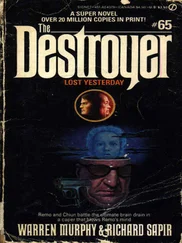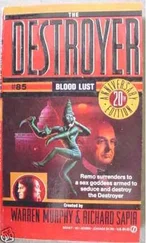Warren Murphy - Last Rites
Здесь есть возможность читать онлайн «Warren Murphy - Last Rites» весь текст электронной книги совершенно бесплатно (целиком полную версию без сокращений). В некоторых случаях можно слушать аудио, скачать через торрент в формате fb2 и присутствует краткое содержание. Жанр: Детективная фантастика, на английском языке. Описание произведения, (предисловие) а так же отзывы посетителей доступны на портале библиотеки ЛибКат.
- Название:Last Rites
- Автор:
- Жанр:
- Год:неизвестен
- ISBN:нет данных
- Рейтинг книги:5 / 5. Голосов: 1
-
Избранное:Добавить в избранное
- Отзывы:
-
Ваша оценка:
- 100
- 1
- 2
- 3
- 4
- 5
Last Rites: краткое содержание, описание и аннотация
Предлагаем к чтению аннотацию, описание, краткое содержание или предисловие (зависит от того, что написал сам автор книги «Last Rites»). Если вы не нашли необходимую информацию о книге — напишите в комментариях, мы постараемся отыскать её.
The Sinanju Rite of Attainment sounds like a nightmare for Remo Williams. But as the desciple of the last Korean Master, he can't play hooky.
Bounced around the world to perform the Labors of Hercules, Remo finds the days no joy and the nights sheer hell that stretch his warriors skills to the limit.
And when the final challenge comes, Remo realizes that somebody's dying is the only prize to be won...
Last Rites — читать онлайн бесплатно полную книгу (весь текст) целиком
Ниже представлен текст книги, разбитый по страницам. Система сохранения места последней прочитанной страницы, позволяет с удобством читать онлайн бесплатно книгу «Last Rites», без необходимости каждый раз заново искать на чём Вы остановились. Поставьте закладку, и сможете в любой момент перейти на страницу, на которой закончили чтение.
Интервал:
Закладка:
"What's that?" asked Remo.
"Nothing."
"How do you know?"
"It is only for you and it is from Smith."
"Could be important."
"It is not. The look in your eyes is important."
"I'd better make sure," said Remo.
And because he was showing interest through his pain, the Master of Sinanju allowed his pupil to open the package.
It was a Federal Express pouch, made of a plastic called Tyvek that was so tough it could not be torn or damaged even by truck drivers flinging it carelessly at doors. Houses were now wrapped with Tyvek before siding was nailed in place. It could be cut with sharp blades but not torn by human hands, no matter how strong.
Remo tried to find the flap, got confused and impatiently grabbed the pouch at both ends, popping it apart like a paper sack.
Out spilled a fanfold stack of green-bar computer paper. Remo glanced at the top sheet briefly.
"What is it?" asked Chiun.
"Nothing," said Remo, dumping the stack of paper into the trash bin.
"It is from Smith. How could it be nothing?"
"Because it is," said Remo.
The Master of Sinanju lifted the stack from the trash and examined the top sheet. It was a list of names.
Williams, Aaron
Williams, Adam
Williams, Alan
Williams, Allen
Williams, Arthur
"What are all these names?" he wondered.
"Just names. Forget them."
"Ah," said Chiun, understanding dawning in his hazel eyes. "You demanded of Smith that he seek out a suitable father for you, and this is the list of culprits."
"It's a stack of wastepaper. Get rid of it."
"If you no longer care to seek your wayward father, perhaps I will do so. If only to congratulate him for ridding himself of so intractable a son. Then I will present him with a bill for raising you."
"Stuff it," said Remo, storming from the room.
Chapter 3
Dr. Harold W Smith began his day as he always did. He parked his beat-up station wagon in his assigned parking spot at Folcroft Sanitarium, nodded to the lobby guard as he strode to the elevator and rode it one floor up to his office.
"Any calls, Mrs. Mikulka?" he asked, and Mrs. Mikulka crisply informed him that no, there had not been any calls, a fact that should have been obvious inasmuch as it was six in the morning.
Harold Smith liked to get an early start on the day. Some people were that way, so no one considered it unusual that the director of a sleepy sanitarium in Rye, New York, should approach his boring job with the same brisk urgency as the head of a major TV network.
Smith shut the office door behind him and entered his sanctum sanctorum, an office overlooking Long Island Sound.
The office reflected his personality. Spare, frugal, unassuming. If Smith had chosen the wall paint, it would have been gray, like the three-piece suit he habitually wore. Like the pale grayish cast of his skin. But because Folcroft was supposed to be a warehouse for the chronically ill, the walls were a vapid hospital green.
The office might have been furnished in the 1960s, from prewar castoffs. Except for the desk. It gleamed darkly, like an altar of obsidian, out of place in the slightly shabby room.
A Spartan block, the desk sat before the picture window framing the sound. The leather executive chair behind it was cracked with age, and the springs creaked when Harold Smith dropped his spare frame into it. But the desk was new.
Smith absently tightened the knot of his hunter green Dartmouth tie and reached under the lip of the slab of black tempered glass that served as a desktop. He found a black button and depressed it.
Deep in the desk, under the glass and canted so that it faced the man behind the desk but was invisible to anyone else, a phosphorescent amber screen came to life.
Smith brought his gnarled fingers up to the edge of the desk. A touch-sensitive keyboard lit up. Smith input a string of characters, and the amber screen went through its sign-on cycle.
Smith waited patiently, his patrician face glued to the screen. Behind rimless glasses, his gray eyes watched the familiar process. The virus-check program automatically executed. When it was complete, Smith watched for an on-screen warning light.
There were none. No emergencies. Only then did he relax.
Smith called up the Constitution data base, reading it word for word as he had for the three decades he had operated out of Folcroft, not as its chief administrator, but as the director of CURE, a government agency so supersecret only the President of the United States knew it existed.
"We the people of the United States, in order to form a more perfect union..."
Smith finished his reading, closed the file, and called up the wire-service news digests. Two floors below, in Folcroft's basement, giant mainframes and optical WORM-drive servers toiled night and day, trolling the net, culling information that might indicate a threat to US. security, warning signs of domestic disorder or global peril-all of which fell under the secret CURE operational guidelines.
There had been another overnight Amtrak derailment. This time outside Baton Rouge. It might be simply another example of incompetence on the part of the government-funded company that ran the nation's aging railroad system, but there had been a great many such derailments of late. Smith captured the news digest and dumped it into a growing electronic file marked 'Amtrak.'
If these derailments continued, it might mean a matter for CURE to look into.
There had been an overnight political assassination in Mexico according to Notimex. This was the third in recent months. The situation south of the border was difficult but not explosive. At least not yet.
After reading the extract, Smith dumped it into the Mexico file.
Other items flashed on the buried amber screen. Another American fishing boat had been seized in Canadian waters. The new premier of North Korea continued his courting of the UN, even while making veiled threats against South Korea. The situation in Macedonia still festered.
Problems but no crises. No mission for CURE, Harold Smith reflected.
Which was a distinct relief, because CURE had no enforcement capability at present. He was on strike and vowed to remain on strike until Harold Smith had found his parents.
It was ironic, thought Smith as he turned in his chair to face Long Island Sound with its sun-dappled waters and scooting skiffs. Remo Williams had been selected to be CURE's enforcement arm precisely because he had no living relatives. There had been other candidates, all collected by the very mainframes that still hummed in the Folcroft basement, but only Remo had all the qualifications to fulfill the mission.
When CURE was set up in the early 1960s, there had been no thought of an enforcement arm. A new President of the US. had taken up residence in the White House full of hope-and discovered the nation faced its greatest crisis. It was tearing itself apart. The laws of the nation were no longer enough to hold society together. The Constitution had been made obsolete by lawless forces.
That President had faced as stark a choice as Lincoln had a century before. Take drastic action or forfeit the nation.
Two options had presented themselves. Declare martial law or suspend the Constitution.
The President had wisely done neither. Instead, he had plucked an obscure information analyst named Smith out of the CIA and installed him as head of CURE with a mandate to clean up the nation and preserve American democracy even if it meant riding roughshod over the Constitution of the United States.
Which Harold Smith did with a grim relentlessness over the course of CURE's first decade. And it was the reason why, at the beginning of every work day, he dutifully read the most sacred document in American history. It was a reminder of his awesome responsibility and a kind of silent act of contrition. Harold Smith believed in the Constitution. He just didn't believe in sacrificing the greatest democracy in human history to the inflexible demands inscribed on a sheet of parchment paper. Nor did he believe that the great democratic experiment called America had failed abysmally.
Читать дальшеИнтервал:
Закладка:
Похожие книги на «Last Rites»
Представляем Вашему вниманию похожие книги на «Last Rites» списком для выбора. Мы отобрали схожую по названию и смыслу литературу в надежде предоставить читателям больше вариантов отыскать новые, интересные, ещё непрочитанные произведения.
Обсуждение, отзывы о книге «Last Rites» и просто собственные мнения читателей. Оставьте ваши комментарии, напишите, что Вы думаете о произведении, его смысле или главных героях. Укажите что конкретно понравилось, а что нет, и почему Вы так считаете.





